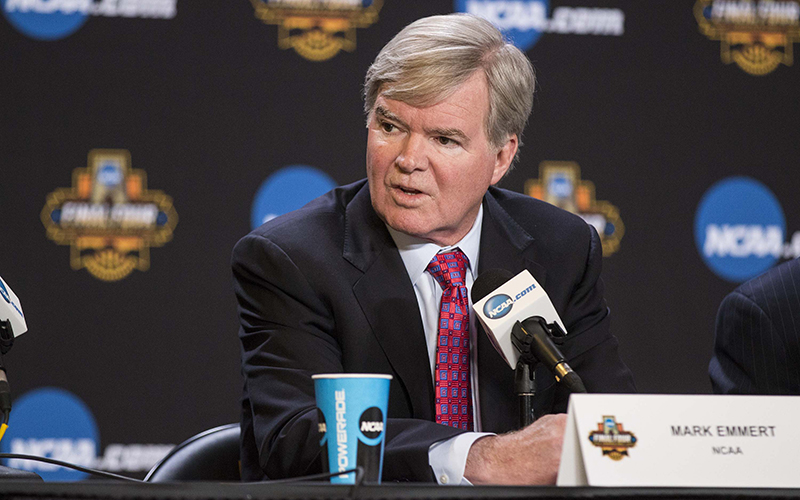GLENDALE – NCAA president Mark Emmert said at a Final Four news conference that the organization’s board of directors will make a decision in the coming days about whether the NCAA will hold championship events again in North Carolina, where lawmakers have overturned House Bill 2.
More commonly known as “the bathroom bill,” HB 2 removed protections for members of the lesbian, gay, bisexual and transgender community in North Carolina, drawing public protests. The NCAA decided to remove several of its events as a result.
“We’ll discuss and debate the issues over that timeframe, and then hopefully we’ll be in a place where we can announce what our board’s decision is the first part of next week,” Emmert said at the news conference held at University of Phoenix Stadium earlier this week.
Officials from the Atlantic Coast Conference, which removed 10 neutral-site events from North Carolina in 2016-17, said Friday they will consider holding championship events in the state after the law was repealed Thursday.
North Carolina, which is an ACC member school, is among the teams competing in the Final Four.
Emmert said the NCAA has tried to accommodate North Carolina’s decision making process.
“Normally we would have started making decisions about site locations actually months ago,” he said. “We worked with (senior vice president of NCAA basketball Dan Gavitt)’s committee and with all of our sports committees to be able to extend those decisions as far as we could.”
Emmert said pressure for the NCAA Board of Directors to make a decision stems from a need to establish host sites with ample time to properly set up the events. If the NCAA takes too long, he said, it could run out of options.
North Carolina has played host to several key events in the past and was slated to host seven different championship events in 2016-17 before the Board of Directors’ decision.
“Everybody loves being in North Carolina for our games,” Emmert said. “It’s a state, obviously, that in many ways is synonymous with college sports. They are great hosts. Nobody made the decision to leave North Carolina casually. It was a very, very difficult decision for the board to make, and I’m sure the next decision will be very difficult as well.”
The removal of NCAA championship events, as well as the NBA All-Star Game, from North Carolina mirrored similar moves made against Arizona — the host state of this year’s Final Four. The state lost the Super Bowl in 1993 after voters rejected honoring Martin Luther King Day as a state holiday.
When Arizona hosted the Major League Baseball All-Star Game in 2011, it was met with public protest due to the recent passage of SB 1070, an immigration bill that would have allowed law enforcement officials to check the immigration status of any person detained or arrested.
The public outcry threatened another Arizona Super Bowl bid, but Glendale was awarded Super Bowl XLIX in 2015.
When Arizona was awarded the bid in 2011, NFL Commissioner Roger Goodell admitted it had not been an easy decision.
“We are thrilled to be back in Arizona,” Goodell told the San Diego Union-Tribune in 2011. “I will say it was a difficult choice.”
Arizona has gone on a run of hosting major events after parts of SB 1070 were overturned. University of Phoenix Stadium, which is the site of the Final Four, recently has played host to Super Bowl XLIX, the 2016 College Football Playoff national championship game and the 2015 NFL Pro Bowl.
The 2018 Final Four is scheduled for San Antonio, Texas, where a similar bill to HB 2 is currently being introduced. Emmert said the NCAA has no issue with the proposed bill yet because it has not been passed, adding that there were about five states with similar bills being introduced.
“You know, one of the things that we’re trying hard not to do – when I say we, I mean me and the board and everybody involved – is not to try to second-guess states where they’re going to go or they’re not going to go,” Emmert said.
“Moving the Final Four is a very difficult thing to do, obviously. It’s not like moving a regional or a first or second round. I don’t know what the timeline is. Dan (Gavitt) will lose more hair, though, if I set a specific date and he has to meet it.”
Emmert said the ongoing North Carolina situation, as well as other legislations that would make it difficult on student-athletes and member institutions to function in an accepting environment, has been difficult to handle.
“I don’t think there’s necessarily pride to be had in this process,” he said. “We’re simply trying to do what’s right for our students. It’s easy to forget that this isn’t about a great big event like this. It’s not just about entertainment. These are 1,100 universities and colleges.
“Universities and colleges look at the world as higher education institutions. They want to make sure that their students, their staffs, their fans, are having an experience that provides a safe and inclusive environment that reflects what they care about as institutions.”
